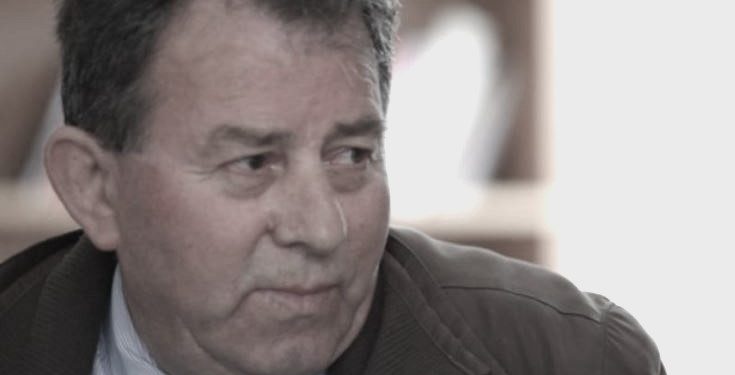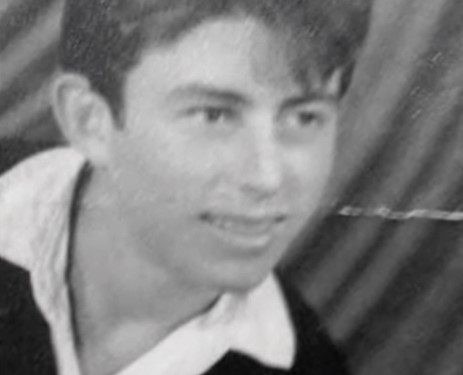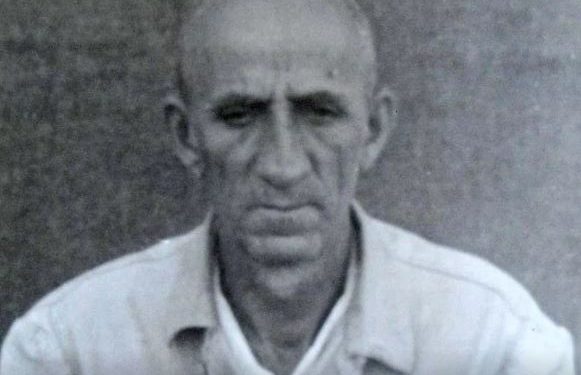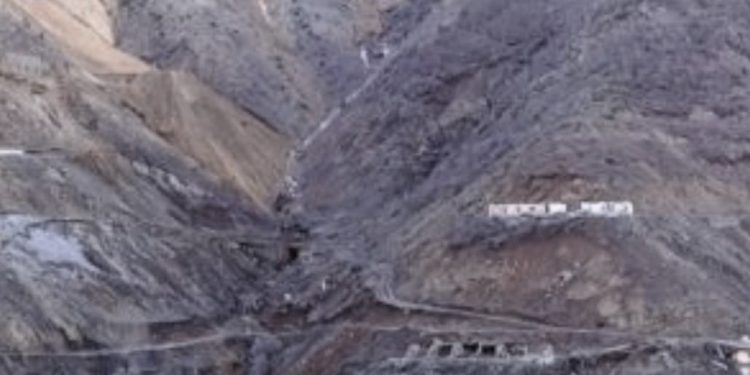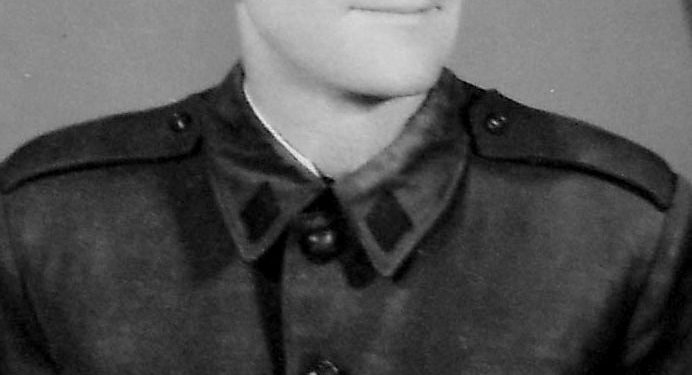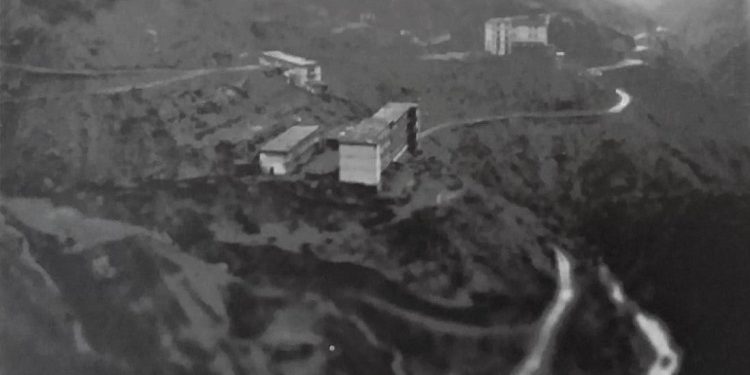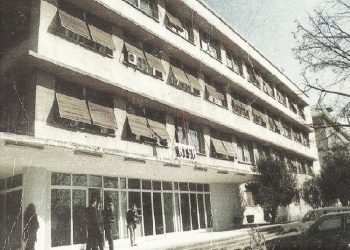By Shkëlqim Abazi
Part Eighteen
Memorie.al / I were born on December 23, 1951, in the black month, of the time of mourning, under the blackest communist regime. On September 23, 1968, the sadistic chief investigator, Llambi Gegeni, the ignorant investigator Shyqyri Çoku, and the cruel prosecutor, Thoma Tutulani, massacred me at the Department of Internal Affairs in Shkodra, they split my head open, blinded one of my eyes, deafened one of my ears, after they broke several of my ribs, half of my molars, and the thumb of my left hand, and on October 23, 1968, they took me to court, where the unfortunate Faik Minarolli gave me a ten-year political prison sentence. After they cut my sentence in half, because I was still a minor, sixteen years old, on November 23, 1968, they took me to the political camp of Reps and from there, on September 23, 1970, to the Spaç camp, where on May 23, 1973, in the revolt of the political prisoners, four martyrs were sentenced to death and executed by firing squad; Pal Zefi, Skënder Daja, Hajri Pashaj and Dervish Bejko.
On June 23, 2013, the Democratic Party lost the elections, a perfectly normal process in the democracy we claim to have. But on October 23, 2013, the General Director of the “Rilindja” government sent Order No. 2203, dated 23.10.2013, for; The dismissal of a police employee. So Divine Providence was intertwined with the neo-communist “Rilindja” Providence and, precisely on the 23rd, they replaced me, no more and no less, with the former Security operative of the Burrel Prison. What could be more meaningful than that?! The former political prisoner is replaced by the former persecutor!
The Author
SHKËLQIM ABAZI
Continued from the previous issue
Rreps
(Forced Labor Camp)
Memoirs
The imprisoned General Halim Xhelo: “In our parts, taunts are sung with iso-polyphony. The insulted person couldn’t stand it, and either he himself or some hothead from his clan would raise their gun and start blood feuds that never seemed to end. Now, on the other hand. When a death occurs in a family, the entire extended family gathers, friends, in-laws, and the village, of course, with their heads bowed, they show up at the house of the deceased. After consoling the children and relatives, they offer their help according to their means and the occasion; some with money, some with advice, and some with muscle.
They put aside old resentments, even forgetting momentary blood feuds, and all together, they perform the last honors for the dead. Then the customs continue, receptions for the seventh day and the fortieth day, for six months, and for a year, and so on. Ultimately, however the deceased may have been, good or bad, wise or quarrelsome, death, like a golden lid, serves as a bridge of unity for the living.
Now, the moral of these fables: we communists, who are here, just like the ‘kokoshët’ (ants) of the fable, have voted for each other’s punishment. Secondly: being winners, we all aimed for the corner, that is, to be the first groomsmen, but as the wise saying goes: ‘I am the boss and you are the boss, but who will hold the donkey?’ we began elbowing each other. The one who was more skilled at intrigue would outdo his comrade, win the sympathy of the top brass, and take his place. In the beginning, these things happened in the name of idealism, later for pragmatism.
The incorrigible idealists, like me and a few others, ended up before the firing squads or behind bars, in the prisons and internment camps that we ourselves built. The other side: that’s all of you. But I must admit, you are true nobility. Your tolerance is a characteristic of great characters, and I am proving this myself, here in prison. In all honesty, you were condemned by fate and geopolitics, as you belonged to the losing camp, which means a misfortune fell upon you that united you and made you more solid, which is why you get along so well, even though you belong to different political currents.”
He fell silent, and this logic impressed me. The perspective from which this pug-nosed general viewed social sides was extraordinary.
Here is the next question that relates to the topic.
I: “Mr. Halim, how do you foresee the future? How much longer can the communist hegemony last?”
Halim Xhelo: “To reach a conclusion about the near and slightly more distant future, one must analyze a series of factors that are in a way interdependent. But the phenomena that determine developments and influence the acceleration or slowdown of events are in regional or global politics at the level of superpowers. I have tried to reason, during these months of solitude in the cell, about the events that occurred in the socialist camp, especially the recent developments in Prague, where Russian troops intervened forcefully and, despite the resistance of the Czechoslovak people, the ‘Prague Spring’ was drowned in blood. America and the West remained with the rhetoric of words, and despite their democratic opposition and rhetoric; they did not dare or did not want to undertake more concrete actions. This implies that they do not want to disrupt the balance.
Ultimately, there is a tacitly accepted equilibrium. I think this won’t be eternal; after about two decades, the center of gravity might shift towards the West. The Communist East, for hegemonic reasons, is deeply divided, even though it outwardly maintains a façade of unity. Above all, the socialist system is politically imperfect and economically failed, unable to cope with the increasing productivity of capitalist-Western society. Undoubtedly, at some point the balance will be broken, and the race in the field of modernizing military armaments, which have a very high cost, will begin, and the consequences will have repercussions on the economy. I foresee a negative impact on the mentality of the masses; as a result, the Communist East will continue to lose the image of a ‘tiger’ and the trust of its own people, while the economy will continue to fall at a rapid pace. But, in any case, this state of inertia will last for another two decades.”
He fell silent again. He was very decisive; a true career military man. But I provoked him again.
I: “Mr. Halim, specifically how many more years, because two decades seem like a lot to me?!”
Halim Xhelo: “Listen, you stubborn boy, it’s nothing to scoff at, but in this case, I would like to add that not everyone will have the chance to live to see that day! This is not only because of physical longevity, but they won’t let us live. I know them well; I have eaten from the same bowl! That’s why I spoke, so that you and the few young people who heard me can pass it on to future generations. Maybe you will make it! Undoubtedly, they are too many for the life and history of a nation, for you to be lucky enough to come out alive, but in any case, it remains your duty to pass it on to others.”
He fell silent, this time for good. And I didn’t ask him any more questions. Years and years passed from that day, the arrogant general is no longer alive, but he was almost zero percent wrong; a full twenty-one years later, communism fell. His predictions came true; the imperfect political system and the unconsolidated economy on the one hand, and the arms race, culminating with the “Star Wars” initiative launched by Reagan and continued by the elder Bush on the other, led socialism to bankruptcy and final capitulation. I remember him with respect for the confession and trust he showed on those days, in the prison he never managed to leave alive. According to the predictions made by the general himself, his former comrades-in-arms and later wrongdoers (that is, the “kokoshët”), cut his life short. He should not have been left behind; that living witness knew too much!
Perhaps anticipating that I would not have this opportunity again, I asked him a bunch of other questions on those days, and the cynical general spoke as rarely before. But for the moment, I will be content with what I have confessed, if the opportunity arises later, I can return to this interview with the answers to the other questions.
***
The next case belongs to a forecaster of the national issue.
I had completed a year in Rreps. My circle of intellectuals had now opened up, not so much because of my merit as because of the conjuncture of the friends who supported me. Through their mediation, I met the old prisoners from all the regions and political affiliations that existed there. Among others, I met a Kosovar who, as it was said, had been a colonel of the Yugoslav U.D.B., Mr. Hashim Toplica. Hashimi was a political refugee from Yugoslavia. After Tito’s break with Stalin, he had left due to his Stalinist beliefs. As soon as he set foot on the motherland, they gave him a “special” reception; straight to prison, now as Tito’s spy!
…This indigestible insult irrevocably hurt the dignity of this man with deep communist convictions. It is not for nothing that they say: extremes meet! From then on, all his passion and utopian communist ideas turned into the opposite, transforming into an unquenchable nationalist torch. The Achilles’ heel for all nationalists without exception remained the Albanian issue and especially the unresolved Kosovar problem. With Hashimi, this was even sharper, due to his origin, but especially after the failure of the utopia of “brotherhood-unity.”
Whenever the Kosovar problem was discussed, Hashimi was the person who spoke with competence, and the others listened to him with special attention and respect. When I met him, Hashimi was in his fifties, a whole collection of diseases had ravaged his body. The long sufferings and endless mistreatment had ruined his health, but he was resistant, patient, and above all, calm and communicative. The knowledge he possessed, the way he presented and defended his theses, his Olympic calm, typical of a diplomat, made him even more interesting and trustworthy in my eyes, so I followed every one of his discourses with special attention.
We quickly became friends through my acquaintances; I talked and listened with curiosity to his opinion on various issues. In 1968, riots broke out in Kosovo over the use of national symbols. Thousands of students and intellectuals from the University of Pristina led this movement. The repression of the Yugoslav authorities was unprecedented, but the resistance of the Kosovar people was equally admirable. After these mass riots, Belgrade’s policy changed course, they were forced to accept some concessions, they allowed the national flag to be displayed for joys and sorrows, but it was the official one, with the star of communism.
This, in many intellectual circles, was considered a great victory for the time. There were few who noticed this heraldic deficiency and even fewer who spoke out. One of them, who could not like this symbolic “oversight” and who spoke out from the beginning, was Hashimi. Despite being isolated in prison, he used various sources of information and had gathered quite a bit of information. As I mentioned above, the channels for absorbing information in prisons passed through certain channels that, surprisingly, no one can believe, except those who have experienced them themselves. With Hashimi, I talked about this topic, exactly on November 28, 1969, on the 57th anniversary of the Declaration of Independence, during the visit we made to him on this occasion, in the company of Daut Runa, Izet Gumeni, and Father Vaska.
And here is the conversation, in short:
“Happy Flag Day, May you soon have a free and united Albania! As soon as possible, with your family and relatives!” – I wished him. He returned the greeting. Then the conversation went to where the tooth hurt the Kosovar issue. While I expressed my enthusiasm for the victory of the Kosovar brothers, who managed to enjoy the right to wave the National Flag at every family event. I considered this fact a significant event for the Albanian people, especially for Kosovo, concluding:
“I believe that after this major victory, the solution to the problem of unification with the motherland will be accelerated!” Hashimi thought for a moment, and with his usual calmness, he said: “I hope it is a momentary solution. Because it is half-baked and very dangerous; through it, the Yugoslav officials have overcome the situation. Many more years will pass until the final goal is reached. In the meantime, the generations of young people in Kosovo will have become accustomed to this defiled Flag, with the communist star. I fear that they will consider it a magnificent achievement and as such, they will see Enver Hoxha as a god, they will attribute the merit of this victory to him and thus they will make two mistakes. Firstly: they are waving a defiled flag, and secondly: they will experience the cult of Enver! By the time they understand the game of Tito and Enver together, it will be too late, the damage will have been done, and the mistake will require a lot of effort and time to be repaired. Forgive me, I don’t want to be a pessimist, but I have to say that it will never be repaired!”
That logic surprised me.
I objected. The others also objected, inviting him to be a realist, to accept the fact that the Albanians also managed to be equal to the other peoples in the entire Yugoslav space, where they were not at all considered a state-forming unit. He was forced to enter a deep analysis and gave us a lesson that at the time, due to lack of information, I took as a delusion of Hashimi, but which later, unfortunately, would turn out to be accurate.
“Let’s reason in order,” – Hashimi argued. – “The Flag is not a gift of Tito’s generosity, but a culmination of the efforts of the Kosovar people. To get here, a lot of blood has been shed, several generations have been sacrificed, tens of thousands of Albanians have been deported across the borders, to Europe, to Turkey, and elsewhere. Gentlemen, for this day, there have been countless terrors, for a hundred years, blood has been shed! An unceasing genocide has been perpetrated on the Albanian people. It started with Toplica, where my family originates from, since 1878, and continued with Chameria, after 1924. It still continues to this day. Yes, yes, it continues! That’s why I consider the victory half-baked!
Just look at the relationships that Tito and Enver have built, and you will be convinced. Every Kosovar who seeks political asylum here is turned back when the Yugoslav authorities demand it, or is sent to internment, or even worse, is sentenced as an agent of the one they hate most, Tito. The same thing happens with the Albanians here; as soon as they flee there, they are tortured and sent back to populate Enver’s prisons. I don’t think I need to comment! The statistics are enough, look how many convicts are here for this reason!
Another thing, by giving this half-right, supposedly for the use of national symbols, they want to throw dust in the eyes of the democratic world, and also the Albanians themselves, for allegedly fulfilled and realized rights, within the framework of self-determination, and on the other hand, to marginalize the violence against the Kosovar intelligence, whom they accuse of separatism and state-destroying arrogance. So, you must distinguish the real purpose; they give sleeping pills and thus perpetuate the occupation of Kosovo, that is, they maintain the current status quo. Possibly forever!”
Again, we objected, we presented him with the fact that the national issue and the Albanian ethnicity require the sacrifices and contribution of everyone, no matter how small at first glance, but with major values; with the final goal of uniting the Albanian lands.
“- Yes, my dear friends!” – Hashimi reasoned. – “Precisely here we all aim, that one day, which I don’t believe will be soon, when the all-Albanian dream will truly be realized, to achieve the missing physical union, but also the crippled spiritual one. But what is actually happening?! Nothing more than they are sowing the seed of division, to divide us forever! Look at the practice! The great powers of Europe first divided us into five states; now five mentalities are being cultivated. This fact is to be lamented! Because even the Albanians themselves have entered this game with murderous consequences!
Notice the people here! An Albanian from the inter-Yugoslav spaces is called a Yugoslav and a Chami is called a Greek. Even worse, the Albanians there call each other by the name of the unit they belong to, such as: Albanian from Serbia, from Macedonia, Montenegrin, Greek for the Chams, etc. And, on this superstructure, the differentiated intellectual formation that is happening, both here and in Kosovo, has an effect. An elite stripped of nationalist feelings is growing. The intelligence in Kosovo is being educated under the influence of the Eastern, but also Western, philosophical spirit, which preaches an open world without borders, and consequently, without national credo.
Naturally, this theory is beautiful, quite attractive for Europeans and cultivated nations, but for us Albanians, who are not consolidated, who live miserably under the dictate of foreigners and under the iron heel of communism, even more so without state-forming traditions and not civilized enough, we need more than ever a common state, where as brothers we can learn to love and forgive each other. But the Serbs, the Greeks, and those who stand behind them, and even some Albanians, is inserting wedges of division between the two parts of the people, inciting anti-Kosovar feelings in the youth here and cosmopolitanism there.
Just take a look at the school curricula; young people know better the history, geography, and economic developments in China and Cuba than in their own country. I assure you, a day will come when the youth here will hate the other part of the people, that of the province of Kosovo, and even Albania itself. Deep chasms are being opened, which will one day have negative effects. Perhaps this can be taken for defeatism, but at least this is what I have concluded from my observations. I hope I am wrong, but they have designed our future to be divided into two states, so that Albanians are not a powerful and determining factor in the Balkans, as we really should be. The worst thing will be that even a minority of Albanians will like and benefit from this situation, while the rest, although they will never agree with this status, for reasons of conjuncture, will have no other solution. In the not-too-distant future, our descendants will curse us when they see us divided into two parts.”
When I asked him when this prophecy could be realized, he made a circular motion with his arm, as if to say: “Ooh, so far!” but with his mouth, he said: “Let’s hope it happens as soon as possible. But I and my generation will not make it. From what the beans tell, Easter will be far away!” – He illustrated this with a well-known defeatist expression. – “It will take another twenty or thirty years; it might happen sooner or later. Inshallah!”
It depends on when communism falls for Yugoslavia to first disintegrate, as a ‘de-naturalized’ construct. Wherever you look at the problem, we are a product caused by the Great Powers; at the genesis of the issue are the wrong decisions of the Congress of Berlin, followed by other treaties. It was a very wrong decision of political Europe, almost a hundred years ago, which only the culprits can repair, when the conditions have changed and the waters have calmed down. Political conjunctures and international geostrategy can accelerate the solution to this situation. In any case, you are young and you will have all the time available to live to see that day…!”
And he ended without exhausting the topic completely, because other visitors came to congratulate him. We who were there got up to free up the sitting space for the newcomers, which also served as a waiting room. I was indeed young at the time. I lived to see the unfortunate day when nearly a million Albanians fled their ancestral homes, brutally violated by Milošević’s Chetniks. To be massacred and raped en masse, under the eyes of the entire international community. But at the same time, I also lived to see the lucky day when the decisive intervention of the North Atlantic military forces took place. The reckoning was coming to its owner! Those who destroyed Albania at the beginning of the twentieth century were repairing the mistake at the end of this century.
To save an entire people who were being barbarically exterminated on the eve of the new century, the democratic states, and especially America, were forced to take urgent and extreme measures, including armed intervention, to protect the lives of innocent civilians. Naturally, to accelerate the process, the counter-response of the bravest boys and girls of Kosovo, enlisted in the ranks of the K.L.A., who, to protect their brothers and sisters, undertook military actions, sometimes even violent, but this was the only way to attract the attention of the international community.
In the early nineties, a part of Hashimi’s prophecies was realized; the disintegration of Yugoslavia, this “de-naturalized” creation, as he called it, had begun. It was also time for the fulfillment of the other part of his predictions, the secession of Kosovo and its liberation from the century-old yoke of Serbia. Naturally, the “Stara-Serbska” propaganda faded before the eyes of the international community; the Reçak massacre and other macabre crimes, which were committed with barbaric coldness against the defenseless civilian population, had awakened the human feeling of the personalities who directed the fates of the world./Memorie.al




